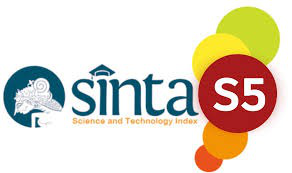Analysis of Pre-Test and Post-Test Results of Motor Skills through the Implementation of Small Games in Physical Education, Sports, and Health (PESH) Learning in Elementary Schools
Abstract
This research aims to evaluate the impact of implementing small games in Physical Education, Sports, and Health (PESH) learning on the improvement of motor skills among elementary school students. The research method employed is a pure experiment with a quantitative approach. Data was collected from 17 students through motor ability tests, including the Shuttle Run, throw and catch ball, and Stork Stand Positional Balance tests. Pre-test and post-test results were analyzed to obtain average scores, standard deviations, and variances. The research findings indicate an enhancement in students' motor skills following the implementation of small games in PESH learning. In the Shuttle Run test, there was an increase in the average score from the pre-test (19.2141) to the post-test (18.7294). The throw and catch ball test also exhibited an improvement in the average score from the pre-test (16.4118) to the post-test (19.6471). In the Stork Stand Positional Balance test, an increase in motor skills was also observed, with the average score shifting from the pre-test (11.3618) to the post-test (7.9676). Furthermore, statistical analysis also indicates a decrease in the standard deviations and variances in the post-test results compared to the pre-test, indicating an enhancement in measurement consistency. This improvement reaches approximately 13.73% in the enhancement of students' motor skills. The results of this research offer positive implications for the effectiveness of using small games to enhance students' motor skills within PESH learning. This underscores the significance of creative and playful approaches in optimizing the learning process to achieve holistic physical education objectives.
Keywords
Full Text:
PDFReferences
Jastrow, F., Greve, S., Thumel, M., Diekhoff, H., & Süßenbach, J. (2022). Digital technology in physical education: A systematic review of research from 2009 to 2020. German Journal of Exercise and Sport Research, 52(4), 504-528.
Suripto, S. (2023). Governing tuberculosis through partnership (‘kemitraan’) in Java, Indonesia: governmentality, discretion, and effects (Doctoral dissertation, La Trobe).
Welk, G. J. (2008). The role of physical activity assessments for school‐based physical activity promotion. Measurement in Physical Education and Exercise Science, 12(3), 184-206.
Ariyana, Y., Bestary, R., & Mohandas, R. (2018). Handbook for High-Level Thinking Skills-Oriented Learning. Directorate General of Teachers and Education Personnel, Ministry of Education and Culture Rights.
Schmidt, R. A., Lee, T. D., Winstein, C., Wulf, G., & Zelaznik, H. N. (2018). Motor control and learning: A behavioral emphasis. Human kinetics.
Davids, K., Glazier, P., Araújo, D., & Bartlett, R. (2003). Movement systems as dynamical systems: the functional role of variability and its implications for sports medicine. Sports medicine, 33, 245-260.
Logan, S. W., Ross, S. M., Chee, K., Stodden, D. F., & Robinson, L. E. (2018). Fundamental motor skills: A systematic review of terminology. Journal of sports sciences, 36(7), 781-796.
Cools, W., De Martelaer, K., Samaey, C., & Andries, C. (2009). Movement skill assessment of typically developing preschool children: A review of seven movement skill assessment tools. Journal of sports science & medicine, 8(2), 154.
Avolio, B. J., Reichard, R. J., Hannah, S. T., Walumbwa, F. O., & Chan, A. (2009). A meta-analytic review of leadership impact research: Experimental and quasi-experimental studies. The leadership quarterly, 20(5), 764-784.
DOI: https://doi.org/10.46336/ijeer.v4i1.561
Refbacks
- There are currently no refbacks.
Copyright (c) 2024 fahmi sidiq, Dede Irman Pirdaus, Muhammad Iqbal Al-Banna Ismail
Published By:
IJEER: Jalan Riung Ampuh No. 3, Riung Bandung, Kota Bandung 40295, Jawa Barat, Indonesia
IJEER Indexed By:
 This work is licensed under a Creative Commons Attribution 4.0 International License.
This work is licensed under a Creative Commons Attribution 4.0 International License.









